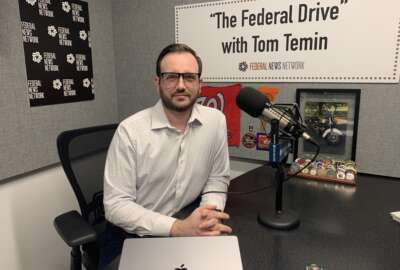Working or retired, don’t overlook either side of the spending-saving equation
Federal employees thinking about retirement --and if you're not, you should be -- tend to concentrate on what they can save.
Federal employees thinking about retirement –and if you’re not, you should be — tend to concentrate on what they can save. When you actually retire, it pays to think about what you spend, or if you want to spend and maximize your Thrift Savings Plan. Federal News Network’s Drew Friedman got more insight when she talked to federal retiree and financial consultant Abe Grungold on the Federal Drive with Tom Temin.
Interview Transcript:
Abe Grungold If you’re an active federal employee, it is critical to maximize to your TSP, so you can have the best retirement possible. And if you’re a federal retiree, it’s important to monitor your expenses, and you may have to live on a budget. So, there are ways to save money for both of these categories of employees. And the first one that you mentioned, is life insurance. So, life insurance, if you’re a federal employee, can be very expensive. And the government offers several life insurance programs that are easily obtained. And then you can acquire life insurance outside of the government. But what you really have to ask yourself, whether you’re an active federal employee, or you’re a retiree. How much life insurance do you really need? You need as much life insurance as you have long term debt. You need to cover that. So, if you’re a young federal employee, you may not have any debt early in your career. And when you’re a federal retiree, you may not have any debt at that stage of your life. So, you need to evaluate how much life insurance do you really need, and you need to shop around.
Drew Friedman Beyond that, there’s other kinds of day-to-day expenses. I know a big one that you have pointed out before is eating out. So how much can federal retirees be spending in that.
Abe Grungold Whether you’re an active federal employee, or whether you’re a retiree. I know that as an active federal employee, we used to eat out every day, which was a big part of our workday was eating out, breakfast and lunch. And as a federal retiree it becomes also a big part of your day, breakfast, lunch, dinner, and getting together with friends. So as a retiree, in today’s dollars, I found myself spending $100 for breakfast a week, $100 for lunch a week. And if I go out three times a week for dinner, I’m spending another $300. That’s $500 a week, you really need to watch that very carefully. And you could save yourself quite a bit of money on the breakfast and the lunch just by eating at home. And if you go out with friends just kind of research what restaurants are out there where you could try to save some money. And today, the younger generation does a lot of takeout. They do these takeout meals from restaurants. And everyone loves restaurants and eating out. And they do the takeout several times a day. You need to monitor that expense very carefully.
Drew Friedman Yeah, that’s something that can definitely add up, especially if you’re not paying close attention to it. Another big one that I would imagine changes for a lot of people over a lifetime, and as you get older, the cost of medicine or medication. Do you have any recommendations for how people can try to budget for that better?
Abe Grungold Yes, medicine is a very expensive thing, both for young federal employees and especially for retirees. You should research the FEHB health plans this coming open season and look to see which ones offer a drug benefit to that health plan. That’s very critical. And I took advantage of that as a federal employee. Now that I’m a federal retiree, I take more advantage to that benefit, because, unfortunately, as you get older you may need medications from time to time. Another good way is to shop around the various pharmacies like CVS, Walgreens, Costco, and price out your medication to those pharmacies, and you’d be surprised that a lot of them offer them at different prices. So, this is a very important thing and also consider generic brands. You can save yourself a tremendous amount of money with generic brands.
Drew Friedman Couldn’t opening maybe a flexible spending account or a health savings account also help with some of those costs?
Abe Grungold Absolutely. I certainly took advantage of my flexible spending account, because you are contributing pretax dollars. And you can get reimbursed for any type of a medical needs such as medicine, doctors, offices, etc. But you really need to budget how much health care expenses do you think you’re going to need for that year, nobody can really project that unless you’re going to have a surgery or something. Because you certainly do not want to lose or leave behind any benefits in that plan for that year. They can expire after the year in some time after that.
Drew Friedman I want to move on to something that’s maybe a little more fun for people to think about is traveling. And I know that’s something that can change a lot, especially in retirement, you have more time. And it’s very tempting to go on all these trips. So, what are some recommendations you have for how to budget best for traveling?
Abe Grungold While traveling even for a young federal employee, I traveled to 39 States while I was a federal employee, and I tried to take advantage of where I was to try to extend that trip if I could. But traveling on different websites provide different types of pricing. And also, different days of the week are critical for airlines. And you need to research that out. Think about flights, hotels, rental cars, you’d be surprised if you check out various different websites, like Expedia. If you’re a Costco member, check out the Costco website. You will be amazed at the difference in pricing for various types of travel. And as a young federal employee or now that I’m a retiree, I want to travel. I’ve always loved traveling. So, you need to be careful with your spending on traveling.
Drew Friedman I definitely will be taking that advice to heart, I enjoy traveling a lot myself. Thanks, Abe. And last one on your list, you talked about five different areas of spending. So, we’re now the last one. And this is about communication. Can you explain a little bit more what you mean by that?
Abe Grungold Yes, certainly if you have a spouse, or a life partner or you’re in a relationship where you’re living with someone, you need to communicate with that person regarding expenditures.
Copyright © 2025 Federal News Network. All rights reserved. This website is not intended for users located within the European Economic Area.
Drew Friedman is a workforce, pay and benefits reporter for Federal News Network.
Follow @dfriedmanWFED






